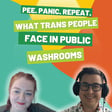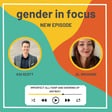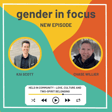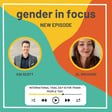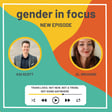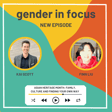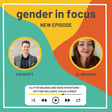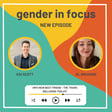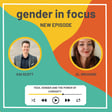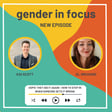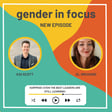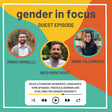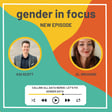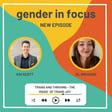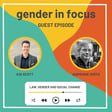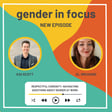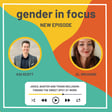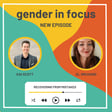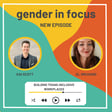Introduction to Gender in Focus Podcast
00:00:02
Speaker
This is Gender in Focus. I'm Elle, and each week I sit down with the president of Trans Focus Consulting and all-round gender diversity genius, Kly Scott. I get to ask all the questions you've ever wanted to ask about how to make the workplace and the world a better place for trans and non-binary people.
00:00:20
Speaker
Let's get into it.
Understanding Trans Day of Visibility
00:00:23
Speaker
In today's episode, we're getting into nuances of Trans Day of Visibility, which happens every year on March 31st. We explore why it's important and what makes visibility tricky.
00:00:36
Speaker
I'm really excited to dive into this topic today with you, Elle. Hello. ah are you doing? Hello. but Good. How are you? i'm doing great. I'm doing great. I'm really excited about this topic because this is the one that people, everyone that I speak to, at least, this is the the one day that people just don't know anything about.
00:00:54
Speaker
a lot of people have heard of like Trans Day of Remembrance or general pride, they have an an idea of that, but Trans Day of Visibility is one that everyone seems to not know too much about. So could you tell us what it is exactly?
Origins and Significance of Trans Day of Visibility
00:01:06
Speaker
Yeah, it's such a good point that many folks have an understanding of a few different days that reoccur every year, ah but this one is you know, maybe ah rising star in that constellation.
00:01:20
Speaker
And it was started by an a trans activist named Rachel Crandall about 15 years ago. And it is intended as a complement to the Trans Day of Remembrance that occurs in November of each year.
00:01:37
Speaker
And just as a refresh in case folks don't know what Trans Day of Remembrance, essentially we lose a lot of folks through transphobic violence. ah People are killed essentially for being trans.
00:01:48
Speaker
And we remember the people we've lost every year, which is just staggeringly high ah for such a small population. particularly among Black trans women, we lose a lot of folks. And so it's it's a deep mourning and very sad and tragic time.
00:02:05
Speaker
It does motivate us to keep continuing the work, but there's also a need to celebrate and the victories that we've had and the good progress that we're making, as well as people just living their everyday lives, right?
00:02:20
Speaker
That sadly is very kind of revolutionary for a lot of trans and non-binary folks. So That's why Rachel Grendel in 15 years ago came up with the Trans Day of Visibility to offer an opportunity for folks, if they could and if they felt comfortable, ah to share more about themselves and what they who they are and ah what they represent and, you know, what are their interests. And just so that we can showcase the diversity that exists within trans and non-binary people today.
00:02:50
Speaker
And so this is a very important place for us to celebrate the important contributions of trans and non-binary folks on trans day visibility. You mentioned that this was sort of set up 15 years ago. And I think some of the discourse that's going on right now is it that trans people have just sort of appeared but in the last five years and that we've just sort of popped into existence. And ah yeah, it's it's definitely spoken about like it's a sort of new thing that trans people exist.
Challenges of Being Visible as Trans or Non-binary
00:03:17
Speaker
um So when it comes to visibility, what does that actually look like? Yeah, it's so true that, you know, of course, trans and non-binary folks have always existed.
00:03:27
Speaker
But typically, especially in the past, and maybe even a bit more these days, have kind of lingered in the shadows of society, been very quiet or very subtle about who they are. Maybe they're not you know, denying or or hiding actively, but they're not stating outwardly.
00:03:46
Speaker
And so that has pivoted as people feel, you know, society has somewhat been more accepting, although it depends on where you are, if that actually occurs.
00:03:56
Speaker
ah But then also people don't want to hide anymore or have to kind of curb or ah even code switch, you know, who they're with, what they're going to say. They just want to live and speak openly about their experiences.
00:04:12
Speaker
um So that can be sharing with folks that they're trans, ah maybe not hiding so much or being more open about what they did on the weekend especially if it entailed something that involves the trans community. Maybe they got together on a spoken word and really want to talk about the themes.
00:04:29
Speaker
And so they're just not holding back in that way, in perhaps the ways that others have in the past, or for some for whom they do have to do that because maybe it's not safe for them to share.
00:04:41
Speaker
So it's, you know, just being more open about one's life or more open about the journey that somebody is taking related to gender affirming care and not to have it this be this kind of odd thing that happens more. It's this is a normal part of their lives and having to make decisions and thinking about and weighing options and and whatnot.
00:05:03
Speaker
And so again, just not wanting to curb that part of their lives. But of course, trans folks and non-binary folks also make very important contributions and being able to highlight those and to share, whether it's in the arts or in the trades or any other area of life, maybe they're volunteer.
00:05:24
Speaker
ah So just being able to recognize the humanity in people and that we're kind of everywhere and an integral part of the communities we're in and also in society more generally.
00:05:38
Speaker
but lot of those conversations around trans issues and non-binary issues are quite negative. They lead with a lot of the topics that you talked about at the beginning with Trans Day of Remembrance.
Celebrating Trans Lives and Joy
00:05:47
Speaker
And so I kind of wanted you to go into Trans Day of Visibility a bit more and why that's so important to kind of have this other side of the conversation.
00:05:57
Speaker
Yeah, so true that, you know, sometimes people can over index on the the tragedy. And there is a lot of tragedy. That's the thing. It is very real.
00:06:07
Speaker
ah But then lose the plot on the like positive, joyful aspects of being trans. And certainly trans day of visibility is that counterpoint to showing that trans people and non-binary folks can lead these very positive, meaningful, joyful lives, and that being trans and non-binary is a part of that. It's not like a separate thing that they have to kind of overcome or struggle with.
00:06:34
Speaker
It's an integral part of who they are and contributes to their ability to show up in their lives. I think about my own experience when I first came out, like there was sudden integration of everything that I'd kind of kind of shut out ah being trans and kind of hoped it would go away eventually, which never does.
00:06:53
Speaker
um So once it's integrated and and visible and affirmed by the folks around me, friends, family, in the workplace, then you know it's just like becoming 3D fully formed and to to share one's story is such a powerful thing and that includes the positive aspects, right? The things that people are excited about.
00:07:16
Speaker
Of course, it doesn't always have to be about being trans. People can be excited about, you know, art, video games, volunteering, you know, just all the everyday, almost banal things in their lives, right? But that makes somebody this fully formed human being.
00:07:34
Speaker
And so that visibility is so key to it that aren't having to kind of ah hide any aspects of
The Complexity of Coming Out as Trans
00:07:41
Speaker
themselves. It's just more out there, whether it's the kind of positive things, but also to be able to talk about one's struggle I really liked what you just said about being three d And this is actually my first trans day of ah visibility out.
00:07:57
Speaker
Oh, cool. So I know, really weird. like and Visibility is such a nuanced topic. And there is a certain, for me at least, nothing has changed in terms of, you know, I'm not ah i'm not taking any hormones. i'm not My name is the same as it was. My pronouns are the same. as just like an addition of, um I went by she, her my whole life, and then I've just added they, them, too.
00:08:20
Speaker
And so nothing particularly dramatic has changed for the people around me. But for me, this is a really important moment because I finally feel like it real. i felt I feel like a real person as opposed to like a little puppet. And it's ah it's a really beautiful feeling, but but it's also, it took me a really long time to kind of own it and...
00:08:41
Speaker
even Even now, I've told people who I see every day and I'm not hiding it from other people, but I've just not said anything to anyone else. And so visibility is really complicated and it's not just a case of popping up and telling people that you're trans or non-binary.
00:08:56
Speaker
So ah how can you talk about the kind of challenges that come with visibility and like why it's not as simple as that? Oh, and thank you so much for sharing. I'm so excited for you that this is your your first trans day of visibility.
00:09:11
Speaker
And I so relate to the feeling real, right? ah Versus being. kind of playing or, you know, it's like, it can be like, like, even a bit fun. Maybe that's not your experience, but me, you know, you could play around a bit and it's, it's fine, but there's something very tangible and like landed and grounded in being real.
00:09:34
Speaker
That's ah such a cool thing. So visibility, while very exciting and really important in the ways that we know we've been talking about, ah it also comes with its challenges, its risks. So it's not simple or straightforward for everyone.
00:09:52
Speaker
And I would say even you know for people who are privileged, it can also be you know um a bit of a, depending on who you're meeting, It's challenging, right? And the reason why it's challenging is because you know visibility comes with safety consideration. So it's still still very stigmatized. And I would say even um in the current environment becoming increasingly challenging and, you know, there's pushback on people being trans and and non-binary and ah there's a discourse happening around, you know, are people, trans people real? You know, all these questions and um concerns that are being stated and and whatnot.
00:10:37
Speaker
And that can put that could be place a lot of risk on somebody if they're going to share with someone they maybe don't know or they've entered an organization where they don't know where if the organization will have their back. So it can put people in a precarious position.
00:10:53
Speaker
to come out and share more about themselves. It's this trade-off between being seen or being safe.
Assessing Risks of Visibility
00:11:02
Speaker
And that's a constant calculus that trans and non-binary folks are are facing.
00:11:08
Speaker
Now, of course, some folks are visibly trans, in which case there's it's it's out there in ways that people react to. um But for some, it is a little bit more something they need to share to show to people, in which case there is um that kind of calculus that people put in their heads.
00:11:28
Speaker
And I do it myself and I'm extremely out. It is my job, right? Yeah. And yet I still, you know, especially with, you know, I just took a trip down to the U S I was very cautious.
00:11:42
Speaker
And, you know, so there I'm trying to minimize my visibility as a trans person. you know, I went through security and some stuff happened. I recently took a flight.
00:11:53
Speaker
ah So, you know, there's all these things where we're presented with opportunities to either say something or, you know, remain quiet and either less or not visible as trans folks. So it's not a one and done, as you described.
00:12:11
Speaker
It's this constant decision making. And it it is actually very tiring to think through, you know, because we can't know everything or anticipate everything. And so it does make it very difficult. And sometimes I get it wrong or people in the community i that they weren't able to effectively do that or they didn't have all the the the factors. And so unfortunately have have put themselves in harm's way, right?
00:12:40
Speaker
Can you talk about the different, I don't want to say levels, but there's different ways of being visible. And so like I described how I'm not exactly in, but i but but I'm not out either.
00:12:53
Speaker
Like it's sort of, i'm I'm in a halfway point. And for some people, it it visibility just looks different for different people. and Could you go
Personal Comfort and Environment in Being Out
00:13:00
Speaker
into that a bit? Yeah. visibility isn't a binary essentially, right? It's not one or the other, you know, either visible or you're not, right?
00:13:09
Speaker
And we've done ah quite a bit of research on this at Transfocus. We conduct surveys among trans and cisgender employees at organizations and we do ask about being out.
00:13:22
Speaker
And I think we have about five different categories of outness. There might be more, i don't know. But, you know, there's the not out at all to anyone. And I think people understand that intuitively.
00:13:35
Speaker
And then there's completely out to everyone, right? But in between, there's a bunch of other ah categories, right? There are folks who, for example, don't say anything actively, but they're not hiding it actively.
00:13:48
Speaker
There's that kind of nuanced piece. There's others who kind of share on a need to know basis, right? If it's relevant to the conversation, they'll share. Otherwise, it's kind of a mute point for them.
00:14:00
Speaker
ah Others share selectively depending on who they trust or who they know are safe. Otherwise, they tend not to share or or tell.
00:14:11
Speaker
um And for others, it's more of, I think there was a fifth category, but I'm i'm i'm b blanking on it, but there's just gives gives you some texture of just how many different ways there are to approach this type of thing of visibility, ah where if people aren't attuned or know to give space for people being trans or non-binary, ah if they're not themselves, say they're cisgender,
00:14:38
Speaker
and then they might totally not get the opportunity to know somebody in a deeper way. And so it's even the posture that cisgender people have towards others that can either elicit that information or completely skip over it, right? So if people are making assumptions, I'll just give an example of how people were raised one way or another that can often provide the space for folks to share more about a childhood that maybe it wasn't what they expected right if you think about a trans woman she was socialized as typically as a boy right and so if people aren't making those assumptions about folks
00:15:19
Speaker
you know, there's space provided for um a trans woman to talk about being raised as a boy, right? Rather than everybody assuming that she was raised as a girl, right? So things like that can allow for more space for folks to share if they want to.
00:15:33
Speaker
Yeah, I don't know if you have anything else from your experience that adds another category of of those those different types of the kind of levels of being visible. I think, well, assumptions are a really big one for me because i I was raised a girl and I'm very feminine in the way that I dress and present myself. And so,
00:15:55
Speaker
There was never room like it actually took me a very long time to acknowledge something wasn't quite right. Or I knew something wasn't quite right for years and years. And and it was only because I'm around other trans people that I was like, this is uncomfortably familiar.
00:16:11
Speaker
And so ah somebody I'm very close with um went through their transition and it really shone a light on things that were going on for me. and But even then it took me years to actually say something, but it was a very deliberate choice.
00:16:24
Speaker
to come out when I did because of kind of everything that's going on at the moment, particularly down in the States right now. It was like a very... It was a conscious choice because it felt like trans and non-binary people weren't getting to give their side or other people were speaking over trans and non-binary people.
00:16:44
Speaker
does that Does that make sense? Yeah. yeah Rather than, you know, taking the dominant, well, I don't know if it's the dominant narrative, but certainly the the narrative that's being pushed on folks, you're kind of pushing back on that. And it's like, no, this is my story along with others telling theirs, right?
00:17:03
Speaker
Yeah, for sure. And also, like, there is this idea that non-binary people look a certain way, like that everybody is androgynous. And to be non-binary, you need to dye my hair pink and raise it have it super short and get into musical theatre.
00:17:17
Speaker
And that's not that's not my story. Love that for the people for whom that is their story, but that's not mine. And that is that narrative that's being pushed, that for example, non-binary people don't exist in the first place. And that if they do exist,
00:17:28
Speaker
they look certain way and they act certain way and they are a certain way. And actually that's not true. There is so much variation with everybody as there is with cisgender people too. And it was important to me to kind of own it because feels very intimate for me. I don't, I don't know why, but my gender feels really intimate. And so I didn't want to share it exactly, but there was something about having somebody else tell those stories and make decisions differently.
00:17:52
Speaker
on behalf of other people that made me want to be a bit more visible. What you were talking about was making assumptions about people's past shuts down almost a way of sharing anything
Impact of Gender Assumptions on Trans People
00:18:04
Speaker
about yourself. I felt like I was really keeping a secret all the time when people would make assumptions no or I felt like I was making ah like a fuss almost. Like if somebody made an assumption I would then feel like i in my head I was constantly thinking, well should I correct someone or should I say something?
00:18:20
Speaker
And I almost didn't listen to the rest of the conversation because I was too busy thinking, do i say anything? Do I not say something? And so actually not making those assumptions meant that I never had to do that. It was just, it's an open conversation and I can share the bits that I want to share without thinking, am I going to be making a drama of nothing? Or am I going to be moving a conversation in a way that doesn't need to go?
00:18:42
Speaker
Having those assumptions made makes that really difficult. Absolutely. Yeah. I don't think people realize how harmful assumptions are. They think it's like, oh, this little benign small thing, like oopsie kind of thing.
00:18:57
Speaker
But actually it actually blocks people from each other. It's like a wall that somebody puts up. uh inadvertently it's not like they're intentionally trying to do that but they just didn't realize by making it you know just kind of jumping into conclusions about who somebody is and based on especially how they look right like look it's so distracting um and i just wish people would be able to see that of course not just with trans and non-binary folks i mean we make i i try to monitor my own assumptions about other folks on other topics right
00:19:30
Speaker
Because I'm sure I'm also creating barriers to other folks by the things that I say. So as much as possible, these open ended questions where, like you're saying, people can choose their own ability or, you know, how they're feeling that they ask how much they want to open up because you're right.
00:19:47
Speaker
Gender is something very intimate. And I think gender people don't realize that about trans and non-binary folks. ah For them, it's a very public thing. Of course, look look at me, you know, like this is who I am. It's like, well, cool that, you know, society has been set up in a way that allows for that, you know, in visibility, but it is something i a little bit trickier for trans and non-binary folks where there's a lot more cognitive load. And I love how you broke that down.
00:20:18
Speaker
mean, I don't love that it happens to you because that's like... a huge amount of labor, right? ah But just those small little adjustments in how we approach each other by reducing or eliminating assumptions can really help get access.
00:20:35
Speaker
Not that we're gunning for access, but it's just more that it's possible. It's a pathway that people can choose. And it's super important. When assumptions are made, it almost feels like, I don't know how to describe it beyond I feel like I've literally just been stripped.
00:20:50
Speaker
Like, that I'm very vulnerable in front of someone when they've made an assumption about about my gender. Being careful with it, it feels like I get to choose the level of vulnerability. It feels great when someone doesn't make an assumption because it means that I can choose how much of myself I want to share. It's a really nice thing to do. It's like a very kind thing to do, in my opinion. Yeah.
00:21:14
Speaker
And people don't realize when they make assumptions, they put somebody in this position of having to either respond and that that response could create um unintended consequences that you but we can't map out, you know?
00:21:28
Speaker
um and or silence, which is is a form of self-denial, right? And so that's that's pretty harmful to be silent. So it's just this impossible situation where, you know, either way you go, there's some sort of hit to somebody.
00:21:45
Speaker
And i they people don't realize that that's at play for folks. And so oftentimes born very silently. and so And then on top of that, you just layer in the societal discourse. like It's just like heavy upon heavy.
00:22:01
Speaker
And that's where visibility, if possible for folks and chosen in their own determined timeline and way, can be very powerful. And um like that can be the the spark, the joy, the excitement is finally I'm able to own my own narrative um and not have some outside entities, usually quite amorphous, but then also yeah individuals as well. So,
00:22:28
Speaker
Yeah, that stuff is super important. And I like how you describe vulnerability too. I think that's key. People don't often realize how sharing about one's gender or history can be so vulnerable.
00:22:41
Speaker
um Because for for cisgender people, it's no big deal to share. I'm a woman, I'm a man, end of story, right? And ah how does that kind of, what have you seen about that showing up in the workplace, both visibility, but also invisibility as well?
Supporting Trans Employees in Organizations
00:22:56
Speaker
Yeah, we've started to do education sessions on these days ah with a twist. We've added storytelling as to a part of it. And I think that but people are really keen to share stories. um We also obviously allow for anonymity ah to the point about some visibility is quite risky.
00:23:14
Speaker
ah So that's a way to protect folks. So it's good to have options available. Some people are okay to have their names. Others want to be a bit more sheltered, ah totally understandable, especially in a workplace. um But, you know, there are ah trans and non-binary folks wanting to share their story, both of things that they really liked about people, you know, these subtle things that you're describing, um especially from your story, that really make a huge difference that people may not realize how kind and how generous and how expansive their approach is and just highlighting that.
00:23:48
Speaker
Others are, of course, and understandably talking about discrimination and challenges, whether access to washrooms or you know not able to fill out a form, um you know just any number of things that trans people deal with on a pretty much daily basis. So ah But it's just allowing them to to show up um and to be heard.
00:24:11
Speaker
think that's very powerful. I think we underestimate how powerful it is to be heard. a you know and We all have a personal experience where we can remember somebody really listened to us, right? and And maybe even reflectively you know showed caring and and you know active listening by reflecting back what they heard.
00:24:29
Speaker
ah That just like to really hits at a core. um Anyways, that storytelling is very powerful. Of course, that's not the only opportunity for that. if you know If you have a coworker, just being able to get to know them at a good pace, not kind of rushing ahead and wanting to know everything, but then also not you know completely ignoring it either, right?
00:24:53
Speaker
there's kind of fine balance between those two extremes where you allow somebody to share um if they want to. um And certainly other places where we've seen it done really well are surveys. So again, it has that element of anonymity, but still people get to share their experiences where you know organizations get a better understanding of what's happening day to day, both what's really going well that you wanna keep to amplify that, enhance it, ah but also to ah address the things that are going perhaps not so well.
00:25:30
Speaker
in the organization. So there's a lot of examples of invisibility within organizations. Again, ah don't think for the most part people are intentionally trying to ah sideline trans and non-binary folks. It's never, not never, but rarely ill-intended.
00:25:50
Speaker
Now, the the way that folks are invisible is um you know in the ways that things are set up or the culture within the organization. Again, assumptions is a big one that we've already talked about, ah where then people are put in this tough position position of having to respond or not ah to that incorrect assumption, whether it's assumptions about pronouns, assumptions about somebody's past, usually like we talked about based on how somebody looks.
00:26:19
Speaker
ah But it can also show up in in how an organization is structured. If there's no mention of trans people anywhere in the organization, then you know people can hardly see themselves in the organization because there are specific things that need to be addressed.
00:26:36
Speaker
ah I usually just you know search bar, go into the website of an organization and put in the search bar transgender or trans or non-binary. And if no responses come up, like ah that's pretty surprising hi because there are so many different places where it could show up.
00:26:56
Speaker
ah It's also you know extended healthcare benefits. Those include gender-affirming care benefits, the types of washrooms that are available or not, or even how a form is set up if there's only you know one first name field for legal first name.
00:27:11
Speaker
Those are the ways in which the experiences of trans and non-binary folks or the needs are not accounted for. And it literally says we didn't expect trans and non-binary folks to be here to to take care of their issues.
00:27:26
Speaker
And again, it's not because people have, you know, a vendetta against trans people. It's just maybe not on their radar. They're not aware of how deep seated these issues are.
00:27:37
Speaker
But if you think about, you know, gender categories on a survey, if there's, say, a woman is filling out the survey and if woman was not one of the categories to respond to, what would that feel like?
00:27:49
Speaker
i I presume people would, women would be upset, right? And say something and be like, hey, I think there's something missing here. And that's exactly what's happening with trans and non-binary folks is now people are pointing out the gaps and the needs to fill in those gaps. So, um but every time that happens, there is a degree of invisibility.
00:28:11
Speaker
um Some, you know, describe it as an erasure, right? So it's just not, accounted for not ah thought to exist to be represented in various ways that things are set up or the culture of the organization I want to ask you about representation a bit because the fact that there is no mention of it at all is a really hard one to navigate could you can I ask you about that or can you go into that bit Yes, absolutely. So, you know, somebody is joining an organization, you know, they're looking out for for folks that share their experiences, their interests, and that might be a number of different things of which transit being trans and non-binary is one of them,
00:28:55
Speaker
It's not the only thing, but is an important aspect. So if there's nobody else out at an organization, or nobody exists that is trans or non-binary, ah that puts a big burden on that person.
00:29:10
Speaker
One, they are typically seeing all the gaps that exist and a personally experiencing them saying, ooh, what about this? What about that? And having to ask a lot of questions of HR or their manager.
00:29:23
Speaker
ah So it puts a lot on them to have to figure out how they... fit in to the organization almost literally um versus if there is somebody who is already there or many maybe even a handful of folks, um ah then that there's kind of an assurance. There's ah an ease because typically there's been a it the path has been plowed, right?
00:29:49
Speaker
ah if Thinking about snow analogies, right? ah Walking through snow and trudging through it and postholing, not so much fun. And this is a very Canadian.
00:30:01
Speaker
ah was about to say it's the most Canadian analogy I can think of but i mean but yes continue of. But if the path has been cleared and it's only fresh in my mind because I did a bunch of snow clearing during my trip in Edmonton. So.
00:30:16
Speaker
um We have a bit of snow in Vancouver, but not so much as other parts of Canada. And, you know, clearing that path, especially having trans and non-binary folks in leadership is really pivotal because that adds a voice not only for the employees at the organization um who are trans and non-binary, but also actually customers, clients, you know, members of the public ah that folks serve, just being aware of what the issues are and being able to speak to those people.
00:30:46
Speaker
you know especially if they're able to be out and to be visible, to be supported in that visibility um can make a huge difference, both for themselves, other employees, but more generally beyond that as well. so And for the benefit of the company, right? It's kind of a triple win in my mind.
00:31:07
Speaker
So ah that representation is key for people to be able to see out invisible trans and non-binary folks in the organization.
00:31:17
Speaker
um And the degree to which a culture or you know how an organization is set up to allow for that. um you know, can either encourage more to come in or discourage because word does travel ah in a very small community and, you know, tips and, yeah you know, information is transferred about organizations and, you know, some are, you know, heralded as as great examples and, you know, more people gravitate towards those and then others are kind of shown as this is probably not terribly safe or a great place to
00:31:54
Speaker
A lot of work that I've done with Transfocus or that I've read ah through my work here kind of speaks to this idea that if we don't have any trans people in our workplace, then what, not what is the need for it, but maybe it doesn't, it that people don't think about it until somebody maybe comes out and then and then everybody's scrambling to try and work out what to do because there are these gaps often. and um My experience of this is a little tricky because I work for Transfocus, so obviously things are set up well.
00:32:22
Speaker
But what I will say is that before coming out, working for different organizations or even working for myself with other people, and then I started working for Transfocus because I'm surrounded by all of this information and I'm reading a lot and I'm working a lot.
00:32:35
Speaker
It was suddenly in the forefront of my mind in a way that it hadn't been before. And that meant that everything sped.
Creating Supportive Environments for Trans Individuals
00:32:42
Speaker
I think it sped my the process of foot coming out up. quite a lot to be honest that's awesome and so i know it's cool it's funny thinking about I would have eventually come out I think because I'd been talking about it for years before I joined Transfuggers but I wonder where I would be if if I hadn't come to to work here but I think that really speaks to this idea that when you do have things set up well you are going to just naturally invite people to be
00:33:09
Speaker
themselves or be be able to be open. It's really important to have this set up before, even if you don't know that there is somebody trans in or non-binary in your workplace that this really needs to be dealt with beforehand. Absolutely. Yeah. And that's such a good point. And thank you for sharing that because that just really illustrates um once again, the analogy of the plowed path, right? It's just to what degree have you has an organization made it easy for folks to And it's not just the folks who are about to come out ah who who want to share more with the organization, but it's actually also for folks who are already out and um for them to know that this is an important and enough matter for an organization to take concrete action and steps.
00:33:55
Speaker
ah And even i know some people looking for jobs will look to see if, you know, there's gender affirming benefits or there's, um you know, and supporting trans people like a toolkit about supporting trans people or it's just something, just certain clues that this is an organization that has cares, considers, has thought about, you know, has put something together for specifically for trans, the unique issues of trans and non-binary folks.
00:34:29
Speaker
um So that's like a really important thing um to to take action on. And certainly, proactive rather than reactive. And I know that comes up as a pretty prevailing theme, no matter the topic, whether it's trans, non-binary, or, you know, issues of race and ethnicity, ah disability and whatnot.
00:34:51
Speaker
ah But certainly, it's not that much extra effort for such a positive impact. And I think that's what we find um when we help organizations with toolkits, ah you know, supporting supporting trans people and in the workplace.
00:35:07
Speaker
people are really, or organizations are surprised by how positive of a response this has. And usually there's a wave of people who come out immediately after. yeah Just like, oh, ah be people have been waiting for this clarity and the the steps and, you know, what the organization is going to do and what the options are and um you know Am I going to have deafening silence? It's just people do not know and what an organization unless it's explicitly stated.
00:35:40
Speaker
um and And also i doing the toolkit, that's where organizations realize, oh, okay, we've got a gap here, here, and here. Let's go fix that as well at the same time.
00:35:51
Speaker
um rather than having a trans or non-binary person have to like go through that gauntlet of getting whacked at every turn, right? might as well have the organization figured out so that, you know, real live trans people don't have to to suffer that, right? So even those gestures are really important.
00:36:12
Speaker
That's so interesting that you find that there's a sudden wave of people coming out immediately after putting those things in place that speaks to the the whole point of trans day visibility so well, because as soon as you create this space, there's a whole group of people sort of bubbling under the surface that can't really be themselves until you put these things in place.
00:36:30
Speaker
I think that's so... great. I mean, it's not great, but it's so great that there are these sort of options that can make that so much easier for people. And I i wanted to ask about, can you also talk to or speak to the way managers and ah HR can show up in order to create an easier way for people?
Role of Managers and HR in Trans Visibility
00:36:48
Speaker
Absolutely. So managers in ah HR or human resources typically play a pretty pivotal role in folks coming out or becoming more visible in the workplace.
00:36:59
Speaker
ah Usually ah folks, you know, employees who want to come out do approach their manager first because they I it depends on the size of the organization, but they typically know the manager a bit more than HR.
00:37:14
Speaker
ah So it is good for managers to be prepared for that type of conversation, even maybe practice what you would say in that initial somebody saying, hey, you know, I'm trans or I'm non-binary. I go by this name, these pronouns, whatever the information that they're going to share ah to be ready to say, hey, OK, this is fantastic. I'm really excited for you.
00:37:37
Speaker
Thank you for sharing. I know this is a big moment for you. um Perhaps avoiding the you're so brave commentary. I know people really want to be supportive, but it just doesn't really land for a lot of trans and non-binary folks.
00:37:50
Speaker
Again, good intentions, but um there's ah For a lot of trans and non-binary folks, we do not feel brave. This is not about bravery. This is about the necessity of being oneself. Like it's just, we have to do this. It's not a matter of choice.
00:38:06
Speaker
ah So, and also there's a few other layers there, but in any case, so just having that prepared, um allow you know, is gets you in a good position to if somebody were to share that, you're you're ready rather than kind of fumbling your words and being awkward.
00:38:21
Speaker
ah That usually doesn't inspire a lot of confidence. um And then also, you know, HR being ready with, you know, toolkit, policy, whatever you want to call it, ah that has a procedure set up already. So if somebody shows up, it's like, yeah.
00:38:36
Speaker
great, we've got it set up, here's some options, let's set up a meeting to go over them, right? So there's just like kind of a fluidness to, it's not like this big outlier where people's eyes go big and, you know, you could see them like kind of deer in headlights, like, ah, we don't have anything set up and there's a mad dash to figure it out, right?
00:38:58
Speaker
um So just even having, you know, managers and ah HR especially those are the ones that have the most intensive work, especially if a first name is changing.
00:39:08
Speaker
um Even if pronouns are changing, those can be updated as well. And and who's doing what? How are you going to share that with the rest of the organization, if at all? Right. So there's different ways.
00:39:19
Speaker
um that you need to be kind of in lockstep with one another ah to to support that person coming out and making that visibility possible for that individual.
00:39:32
Speaker
It is ah an employee-driven process, so definitely want to be listening to the individual needs. Not everybody has the same needs, surprisingly. there is diversity among trans and non-binary folks. So just being attuned to those and listening and being able to implement whatever it is that, like for example, some people are okay to share that they're trans or non-binary, explicitly stating that to employees.
00:39:58
Speaker
Others, they don't wish to say that. They just say, okay, different name and or a different pronoun, whatever the case may be, or in an added pronoun. um And so it's just kind of but walking through that with them and understanding what's just for them to know and what's for others to know.
00:40:16
Speaker
And in that way, you know, visibility can feel like a safe and good thing. But that self-determination is key because as you were noting ah earlier on in the episode, ah a lot of trans and non-binary lives are kind of ah taken out of the control.
00:40:35
Speaker
And so to be able to give, to have somebody in the driver's seat allows them that agency that often is stripped from them. So that's a a key part of it. But certainly coming in, because there's a lot of legwork and to typically trans and non-binary folks, especially those who change their first name or their gender marker, reflecting that in government issued ID is a huge undertaking. And so just as much as people can kind of take off, uh, in agreement, you know, consent of the trans person to take off their plate so much the better, uh, because there's just so much work that, uh, folks have to do.
00:41:13
Speaker
so there's just a few ways that, um, uh, managers and HR specifically can be supportive, uh, in this coming out process. We sort of talking about managers and, and, uh,
00:41:26
Speaker
HR but what about other like like colleagues but also people outside of work just a sort of allies in general how can they participate in in trans-a visibility and this kind of these themes of visibility in a way that still centers trans people and non-binary people so that we don't have that the kind of stuff we were talking about earlier where it's almost almost like that narrative is taken away from trans and non-binary people often um how can Yeah, how can allies participate in a way that honors that and and
How Allies Can Support Trans Visibility
00:41:53
Speaker
centers that? yeah Yeah, that's a good one, because oftentimes people think, oh, it's trans day visibility is just for trans people, when actually it's a really important thing for for allies as well.
00:42:05
Speaker
ah There are events that happen. You know, in usually in bigger cities, but certainly also virtual sessions where people can participate and, you know, learn more about the topic yeah or not just just the topic, but the day and hear people's stories and people write articles.
00:42:25
Speaker
ah There's podcasts like this one, but others as well that you can listen to and and just have that that deeper understanding as an ally to understand the diversity that exists, the nuances of the visibility.
00:42:39
Speaker
We haven't even touched some of the cultural dynamics or so things that come at to play when it comes to being visible ah within different cultures, right? so ah Because being out can be fairly kind of North American concept, right?
00:42:54
Speaker
It's not the only way of being one's authentic self. ah But i think the degree to which people can understand that diversity is really key. um If we think about intersectionality, that plays another factor.
00:43:09
Speaker
And so just being able to hear those stories is really key to that understanding. If, say, you're a coworker or a friend or you know somebody is trans, or if somebody starts, maybe you don't know if they're trans, um but they start to tell kind of more subtle stories, I think it's not just kind of skipping over them.
00:43:30
Speaker
It is listening to them and attuning to them. And then not necessarily asking very pointed questions, but just saying, hey, um this sounds really interesting,
00:43:41
Speaker
you want to tell me more about that? Just open-ended questions that allow that further unlocking. um Because strangely, we get to know each other, ourselves through dialogue with other people.
00:43:56
Speaker
ah So you were talking about having a friend ah that was very pivotal to to your understanding. So by that person sharing their story, you heard echoes of your own And we're able to move and um yeah own it.
00:44:11
Speaker
And there's also things that like even cisgender folks, that the things that they say or the questions that they ask can unlock things in us. And so I think friends, family, people who are close to us are really important in that process. Obviously, we're not bulldozing in to the process, but, you know, like gently being present to ah somebody's you know, exploration, unfolding, evolution, that can be really powerful.
00:44:40
Speaker
And, you know, to be present for that, um ask really thoughtful questions, and even open ended questions can allow people to know that you're interested, that you care, and for that to that vibing to happen.
00:44:54
Speaker
And eventually for that person to know you're a safe person to come to when they're ready to share, like the full story, essentially.
Personal Experiences of Being Visibly Trans
00:45:03
Speaker
Can I ask you about yourself? Yeah, yeah, like okay sure.
00:45:07
Speaker
Can I ask you about visibility? ah Because we've talked a lot about the challenges and also the the kind of how complicated visibility can be. but obviously for you, Like your visibility is integral to your job. Like you're very, very visible. You're very, very out.
00:45:25
Speaker
So how, how does visibility look for you? Or do you still struggle with those nuances or or that, those, um that of balance? Yes. So it is very true. ah Kind of ultra out, max out ah in the sense that, you know, i do education sessions and my introduction includes, you know, that I'm a trans man.
00:45:48
Speaker
I describe what that is. I share stories related to that. Of course, that's not the only thing. I try to add more um statistics, stories from other folks, because of course it's a gender spectrum, ah but certainly trying to have people understand a bit more about what it means to be trans and what that entails, you know the ah stuff that struggles, the positive stuff and whatnot.
00:46:14
Speaker
um, and you know, and having podcasts like this and, you know, occasionally I get called by the media and, you know, make statements in the press and, um, you know, you just, you name it and I, I'm out there. Like you Google me, show up a lot. Right. So, and he also did a TEDx talk. Oh, right. i Like you don't talk about it.
00:46:35
Speaker
And it's so funny. Um, yeah, indeed i did do a TEDx talk, uh, I'm going to add that to the show notes. Elle will be the plug plugger of the TED. um Yes, so so it's kind of very much out there. And you know speaking of the TEDx talk, one thing i knew, of course, this is a national, international, whatever level um exposure, which you know there's positive aspects of like this can help more understanding among cisgender folks, ah spread kind of the nuances of that experience.
00:47:09
Speaker
um you know promote trans focus, I'll be real. so But there is the the ah real decision making came when I was like, oh, right, we're going to put this on YouTube.
00:47:23
Speaker
forgot about that part and the comment section, right? So you'll see in the TEDx talk, the and and I had a very real choice about like, okay, what do I do with these comments? Do I read them, number one?
00:47:36
Speaker
because some of them are not very nice. ah You know, people have various opinions on the topic of gender diversity. um Do I read them? You know, do i ask that they be deleted? You know, on and on. But basically, I decided not to delete them and not to read them.
00:47:54
Speaker
So there's even visibility of of the comments towards oneself, too. ah It also shows up in media articles as well. Anyways, all that to say, I'm very out in my professional life. When it comes to my personal life, if I'm meeting new people for the first time, I am a bit slow to out myself, which to some degree might be possible.
00:48:20
Speaker
it might not be possible for me not to be out because they could google me and come to learn more about me um but i do like the idea of not having to always be trans um if that makes sense because ah you can kind of the visibility is a wonderful thing but in some degree it's not the only thing we were We are. Right. So if you know kind of like overdo the trans, it's not overdoing it, but some just to focus on that so much, which is ironic because we're trans focused. But in any case, in my personal life, I do not want to always focus on it and just, you know, be a Mountaineer, you know,
00:49:07
Speaker
go running, you know be a part of all kinds of stuff, go to shows and comedy and whatnot. So ah tend to kind of be slower to release that information, knowing that if I share that, which I'm obviously very proud of and very excited and it's wonderful, but then that means we're only going to focus, or it could mean that we only focus on that. People get stuck there.
00:49:29
Speaker
And i I kind of am, I've ah done already done that for, you know, the first half of my day. And so I just, the latter half, I really just want to you know, have that just be integrated.
00:49:42
Speaker
Yeah, it just exist. hu Go figure. it's a bit of a balancing act. And certainly sometimes I don't feel safe with folks um either by comments that they've made jokes they've made.
00:49:53
Speaker
I keep it very vague as to what I do. Cause that's usually the outing piece is, Oh, what do you do for work? like ah And I'll, I'll be, I'll say the the most vague responses I'm a consultant.
00:50:07
Speaker
And usually if people aren't curious, they don't ask past that. i'm like, okay, Done. and The next level will be i'm an EDI consultant, so equity, diversity, inclusion. And if they don't ask further, I'm done.
00:50:18
Speaker
And then occasional yeah occasionally, I'll go directly to, you know i deal with, I'm a consultant on gender diversity issues. Yeah. We've talked about this earlier, but there is so much vulnerability in visibility. Being seen and being known is a really vulnerable thing when it comes to dealing with gender diversity and and gender identity. how How does that show up for you? like You talked about meeting new people, but how does that show up for you in other aspects?
00:50:44
Speaker
Yeah. So in my everyday life, there's a few different types of visibility beyond the one that I just described. And one of them is maybe lesser known is, I don't know, there's a bit of like auditory the component to it. So, you know, thinking about my voice certainly has changed with testosterone.
00:51:08
Speaker
It has deepened over the years. And in person, more often than not, I, am based on visuals and voice and a whole combination of things, I am properly, um you know identified or proper pronouns or whatnot as he, him.
00:51:23
Speaker
Now, one thing on the phone, for some reason, things change. And then for, I think on the other end, or maybe they see my previous name or something happens ah where they, i get a lot of mams, I get a lot of misses and whatnot. So this completely improperly identified. Does that happen a lot?
00:51:48
Speaker
ah Pretty much every call. Yeah. So ah guess who does not want to make calls? Right. Fair enough. You know, various, ah the phone company or, you know, whoever, internet, banks, you know, I just not a fan of phoning. back I'm like, can we do this by email?
00:52:08
Speaker
Oh, no, I can't open the account by email. Yeah. It's that moment we were talking about earlier where do I say something do just let it slide, especially if I'm trying to open a bank account? Do I need to, will this create some sort of challenge in being able to you know, fulfill what I'm trying to do.
00:52:29
Speaker
So it really depends in those instances what I do, because that does, you know, out me in a way that I wasn't ready to do, where I don't have to do that in my day to day life.
00:52:41
Speaker
You know, of course, I am out at work, but you know, some ah the the the choice that we were talking about is removed, taken from me. in that moment. ah And typically, I do say something because i I want them to be more attuned to the diversity of callers that they're getting, and ideally shift away from, you know, gender specific language or making guesses about that.
00:53:05
Speaker
ah And, you know, whatnot. So that's one aspect where then, you know, there's a visibility that I need to navigate ah because somebody has made assumptions about me based on the, I guess, maybe my voice.
00:53:20
Speaker
Who knows? Then the other aspect is anytime I go to a gym or a pool, there's the change room to navigate. So my body does look different from other ah men in the change room.
00:53:35
Speaker
And particularly around top surgery, have visible scars that do draw attention. And so there is this ah tricky ah aspect where I am very proud of my body and feels home and fantastic.
00:53:52
Speaker
ah But it does, you know, raise attention ah Some of that it can be questions, you know, what happened, you know, that people want a story ah to back this up. And, you know, that's innocent enough. I don't think that's, I don't always respond to those questions based on my energy level.
00:54:12
Speaker
ah But then again, there's the kind of prompting to have to explain again, right, rather than just existing. Yeah. So there's a lot of ah interesting questions and responses and stares. Stares is another thing.
00:54:27
Speaker
And then, you know, very rarely i do get hostile responses as well, where maybe somebody knows what this is all about, or maybe they think it's a sign of weakness. I don't know, but there's something where you know, there's a ah very direct type of staring that happens.
00:54:46
Speaker
In one instance, I had a group of about five or six men um have a very loud conversation. And then as soon as I passed, there was just like a settle of silence, right?
00:54:57
Speaker
So there's like things where it's not any like direct violence, but certainly they're subtle and not so subtle cues that, you I'm not welcome or um I don't belong here. Right.
00:55:14
Speaker
So those are the types of visibilities where it's quite precarious to navigate the world as a trans person. Yeah. What do you think that, like Imagine if if we have a future where trans-day visibility isn't
Vision for Integrating Trans and Non-binary Identities
00:55:30
Speaker
needed. what What does that look like? what what can you This is such a weird question, sorry.
00:55:35
Speaker
like a world where this isn't necessary, what does that look like? Yeah, if we don't need trans-day visibility, it shows that it's already integrated into the everyday world.
00:55:47
Speaker
ah whether acknowledging and celebrating you know people for who they are and thanking them for for showing up in a in as themselves you know and and being excited for them, then we don't really need to have that.
00:56:05
Speaker
Certainly also if there's not a tremendous amount of you know violence towards ah trans and non-binary folks, that can also help where ah you know, there isn't this kind of question about visibility and and having to navigate and balance it and whatnot.
00:56:21
Speaker
Where, as we were talking about a few times, it's just being able to exist and being integrated part of the larger tapestry of humanity, essentially.
00:56:32
Speaker
pat And where It's not something that's shied away from, and it's also something that's uniquely valuable about somebody, but also not the central thing about them, right?
00:56:45
Speaker
So it kind of ticks all those boxes of like a full 3D human being, which we were talking about as well, right? It's just not such a big deal ah for somebody to be trans. People understand what it means.
00:56:57
Speaker
people are you know not making assumptions that allow space for folks to show up as themselves um when they're ready to do so, we we can be connected with one another as well.
00:57:09
Speaker
Because as soon as we're having to do the mental calculus in our heads, we're unfortunately disconnected from folks and sometimes ourselves as well. And so just being able to make these adjustments that we've been talking about in this episode can go a long way towards building that type of ah more positive, more integrated, more connected future.
00:57:32
Speaker
You mentioned earlier, and I really want to come back to it, um about the live sessions that that you do for Transday Visibility, because you talked about storytelling.
00:57:43
Speaker
Could you kind of explain what what those live sessions look like and what you do in those?
Celebrating Trans Experiences through Storytelling
00:57:48
Speaker
Yeah, absolutely. So we're doing Trans Day of Visibility sessions, um kind of March through April, even though it's March 31st, kind of spans both of those months.
00:58:01
Speaker
And in those sessions, there's and about ah half of it would be some form of education about Trans Day Visibility, as well as, you know, a light refresh on some of the terms and concepts.
00:58:13
Speaker
and a few tips and tools on how to be a good ally, just as a way to um help folks in in their journey. But then the latter half of the session would be you know previously collected stories from folks, usually through an anonymous survey that organizations put out, and essentially allows folks to share their stories, whether they be trans or non-binary, them for people themselves as employees of the organization, or what we're also finding is allies of trans and non-binary folks, typically family members, but also friends and co-workers that have observed and know are sharing from their own
00:58:53
Speaker
allyship journey. And also, you know, typically this is more trans day of remembrance, but they're kind of distressed at the things that they're hearing about trans folks in casual everyday conversations. and And this allows them that opportunity to to reflect and share what's on their hearts and minds.
00:59:14
Speaker
And yeah, this is just such a powerful unity. There's like five or six stories, ah depends on the size of the organization. And um that allows folks to to reflect the diversity and and the the beauty of of visibility in a safe way too, right?
00:59:33
Speaker
um And usually there's some also chat that goes on during the storytelling where people are reacting to certain aspects of the story. So it's quite interactive. People can raise their hand and speak if they wish. so it really is trying to engage folks rather than just being kind of passive recipients of, say, knowledge.
00:59:54
Speaker
It's more engaging them in a conversation about these very important topics. And then typically people have a few kind of questions after the storytelling to be like, okay, what do we do about that? Because Sometimes the stories kind of present scenarios where people are like, yeah, how would I react in that situation?
01:00:14
Speaker
And so they're like, hey, can you clarify that? So there's a little bit more of like at the end, some teachable moments to, especially if it's inspired based on some of the storytelling to help out with some of those aspects. You know, of course, some, especially trans-state visibility will tend to be more positive stories.
01:00:31
Speaker
So that that can be very uplifting and enlightening for folks to see as well. So yeah, that's pretty much how the session goes. But it's very powerful. And people walk away very kind of invigorated, inspired to be a part of the positive change that is needed.
01:00:48
Speaker
I was going to ask that, like how how is it taken? when Because that's quite a different way of dealing with these topics, like having that that storytelling aspect. How is that received? Yeah. So ah as I mentioned, the the and people feel fairly invigorated.
01:01:03
Speaker
ah It's very eye opening for folks. Typically, people see trans and non-binary issues as maybe this distant, maybe even mystical thing. that's happened somewhere else but not here.
01:01:15
Speaker
And when there's the volume of stories and it's not just trans and non-binary folks, I think people are surprised by cisgender folks showing up and not realizing that, you know, trans issues impact cisgender folks because they have loved ones or people who are close to them.
01:01:32
Speaker
And so that's weighing on their hearts and minds as well. Or they're very excited when something very positive happens, right? So this kind of ripple effect beyond and ah trans and non-binary folks is a big aha moment for folks to realize, hey, I can, they see themselves in those cisgender people that are positive, part of the positive trajectory.
01:01:53
Speaker
And then they want, they feel inspired to ah follow that. similar course, this path that's been created, and are very inspired or realize just the gravity of the situation by hearing the emotions, the the struggle, but the the joy, you know the all the different pieces.
01:02:14
Speaker
It's not just a statistic. It's a real live human being in their midst that has these things that besides you know fulfilling fulfilling their counting duties or leaders or whatever, like this is also going on in the background for them. So, or maybe not even background. It's, if it's a workplace issue, it's in the foreground. So yeah, it's, it's really quite powerful and it's very well received.
01:02:43
Speaker
People are like, when are you coming back? i was like, okay, pride. Yeah. That's great. You said something just then that's so true. And I think sometimes this is missed when it comes to visibility is that or actually any aspect of trans inclusion is that these things really affect cis people too. We have such a narrow view of what someone should be.
01:03:05
Speaker
And trans issues span so much more than trans people. Absolutely. Yeah. And that's why, you know, so much of what we're trying to help with in organizations definitely does benefit trans and non-binary folks, but more broadly, it's cisgender folks as well.
01:03:24
Speaker
um And even being able to alleviate some of the struggle from trans folks can also, by ripple effect, of the cis people in their lives also bring down cis stress levels as well.
01:03:37
Speaker
Like just right now, i mean, certainly my family and my friends are asking, like, you know, there's all kinds of stuff happening, whether here in Canada or the US, s you know, it's not a like scary time.
01:03:50
Speaker
And, you know, they're worried for me. And, you know, so they're kind of checking in. So, you know, the degree to which organizations can be a part of the solution, taking away some of that struggle will help trans as well as cisgender folks, whether cis people personally, because they also deal with some of the issues that trans folks deal with, or because they have a loved one or somebody close to them um that they're really concerned about. yeah.
01:04:20
Speaker
It really is, yeah like, has so much benefit.
Encouraging Support for Trans Lives
01:04:25
Speaker
You know, it's, I mean, sometimes a bit too focused, or maybe not too focused, but focused on trans folks, but it's, this doesn't stop there for sure.
01:04:34
Speaker
So do do you have any kind of final thoughts on Trans Day of Visibility ah before we wrap Sure, yeah, it's definitely really important and I think it's a good opportunity to go into some of these nuances that we've unpacked here today.
01:04:48
Speaker
Certainly there are many more. If you talk to another set of trans and non-binary folks, you get even more richness and nuance and and diversity there.
01:05:00
Speaker
But it really gives, hopefully, the listener a good insight as to what is at play for folks and what folks are navigating and how individuals as well as organizations can show up for trans and non-binary folks to to alleviate some of that so it doesn't make visibility so complex and so of dire, especially these days.
01:05:21
Speaker
So creating that safety is pretty fundamental to making visibility this wonderful thing, which it is, right? So that's what I would encourage as a kind of ah key takeaway ah from today's episode. But yeah, it was really lovely.
01:05:38
Speaker
to talk through it and of course thank you so much for sharing sharing your story as well Elle it's so important um because there is such a diversity within such a small community and it's good to to see what that entails.
01:05:52
Speaker
We have the Trans Day Visibility resource that I can link. And I'm also going to link to the Trans Day of Visibility live sessions. So yeah, you can check that out in
Ensuring Accessibility Across Languages
01:06:02
Speaker
the show notes. One thing I'll say about the sessions is they're available in English and in French.
01:06:07
Speaker
ah So of course, we've got myself as a facilitator, ah but there's also another facilitator by the name of Ange. um who they do do lovely, amazing sessions in French. They can also deliver in English as well.
01:06:19
Speaker
ah But just saying, you know, we we recognize in Canada that there are multiple languages. And so we're always um wanting to have full accessibility to our sessions.
01:06:31
Speaker
um Where can we find you, Kai, on social media? The question I always ask you, are the question you voice. Give a different answer every time. Yeah, ah the list. ah LinkedIn, Facebook, we've got Instagram, Blue Sky, Threads, YouTube, and something else.
01:06:48
Speaker
There's something else? I feel like I'm listing. think that's it. Okay. I think you've got the list. And of course, we've got regular postings where, you know, opportunities for micro learning to continue to deepen these pieces. Some of, you know, we mentioned the topic and then we carry on very quickly.
01:07:08
Speaker
And so you may be interested. What about that? or you can join our newsletter as well, where we give away even more in-depth resources for folks to explore these topics and get a greater understanding.
01:07:21
Speaker
You can also email us at podcast at trans focus.ca. If you have any questions that you want us to answer or not me, Kai to answer, ah then um just email that too. And we can see if we can slot that into some future episodes.
01:07:36
Speaker
So it was a nice talking to you. Yes. Same here. Yeah. And thank you so much ah for, for listening to those who are listening and look forward to the next podcast. Bye for now.

